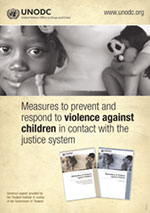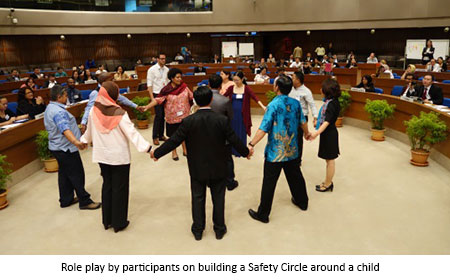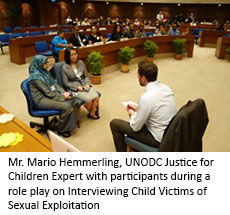
Bangkok (Thailand), 17 November 2014 - Millions of children around the world suffer harm from crime and abuse of power. They come into contact with justice systems as victims, witnesses or alleged offenders, and for care, custody or protection.
The East Asia and Pacific region contains over one-quarter of the world's children - around 580 million children in total. Because of a child's age and still developing maturity, they are highly vulnerable and require special measures to protect them when in contact with the justice system. Yet, in some Southeast Asian countries, children are treated like adults under the law and the justice system fails to consider their needs and best interests or to address the root causes that brought them into conflict with the law.
 'Preventing violence against children in justice systems forms a key component of UNODC's work in Justice for Children,' said Mr. Jeremy Douglas, UNODC Regional Representative for Southeast Asia and the Pacific. Mr. Douglas was speaking in Bangkok as a keynote speaker at a workshop on Responding to Violence against Children in contact with the Justice System. Organised by UNODC in partnership with UNICEF and the Thailand Institute of Justice, the three-day regional training workshop sought to enhance the skills and knowledge of 150 participating criminal justice professionals - police officers, prosecutors, judges, social workers and academics - from 16 East Asian and Pacific countries.
'Preventing violence against children in justice systems forms a key component of UNODC's work in Justice for Children,' said Mr. Jeremy Douglas, UNODC Regional Representative for Southeast Asia and the Pacific. Mr. Douglas was speaking in Bangkok as a keynote speaker at a workshop on Responding to Violence against Children in contact with the Justice System. Organised by UNODC in partnership with UNICEF and the Thailand Institute of Justice, the three-day regional training workshop sought to enhance the skills and knowledge of 150 participating criminal justice professionals - police officers, prosecutors, judges, social workers and academics - from 16 East Asian and Pacific countries.
Other keynote speakers included HRH Princess Bajrakitiyabha Mahidol of Thailand, and Mr. Daniel Toole, UNICEF Regional Director for East Asia and the Pacific, who both delivered speeches that highlighted the importance of a functioning child friendly justice system that will ensure that all children have access to, and are better served and protected by national justice systems
The workshop was the first capacity building initiative of its kind to pilot-test two new UNODC tools related to the recently approved UN international instrument - 'The United Nations Model Strategies and Practical Measures on the Elimination of Violence against Children in the Field of Crime Prevention and Criminal Justice'. The adoption of this instrument by the General Assembly of the United Nations in December 2014 means that UNODC will have a new benchmark for action to identify the needs and capacities of countries and to provide technical assistance and advisory services to prevent and respond to violence against children.

Participants from the 16 countries identified four priority strategies which included promoting research and data collection, establishing effective detection and reporting mechanisms for violence against children, strengething the capacity of justice professionals and enhancing cooperation among various sectors to be able to prevent and respond to violence against children.
At the workshop, UNODC lead trainer and curriculum writer, Dr. Geeta Sekhon, pilot tested a new UNODC / UNICEF training curriculum on how to treat child victims and witnesses. In stressing the vulnerability of children in contact with the justice system and their need for special protection, trainees were encouraged to share real case examples and jointly provide practical solutions on how children should be treated.
 The training methodology - with the key objective to enhance the skills and knowledge of the participating police officers, prosecutors, judges and social workers - consisted of a wide range of lectures, games, exercises, role plays, case studies and group discussions facilitated by Justice for Children experts from UNODC and UNICEF.
The training methodology - with the key objective to enhance the skills and knowledge of the participating police officers, prosecutors, judges and social workers - consisted of a wide range of lectures, games, exercises, role plays, case studies and group discussions facilitated by Justice for Children experts from UNODC and UNICEF.
Building on work by the UNODC Regional Office for Southeast Asia and the Pacific and its Combatting Child Sex Offences programme, the new curriculum - drafted by UNODC - is available in English, Lao, Khmer, Thai and Vietnamese. It is based on a UNODC / UNICEF online training package, Guidelines on Justice in Matters Involving Child Victims and Witnesses of Crime.
Participants pledged to become agents of change when dealing with child victims and witnesses of crime. The pledge, inspired by Yasmeen Shariff, member of the UN Committee on the Rights of the Child was taken at the end of the three-day regional training workshop.